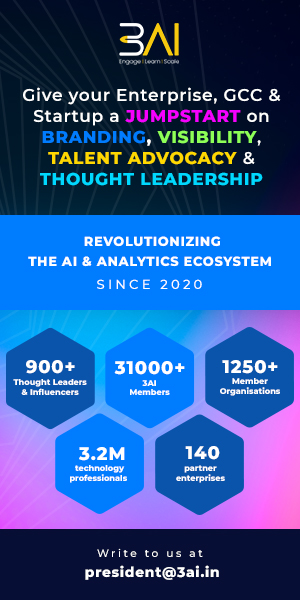High Performance delivered by Analytics Team: A Perspective
3AI July 25, 2014
With the recent massive explosion of data availability, significant leap in computing capabilities, substantial reduction in data storage costs and greater belief of businesses in analytical models has fueled the growth of businesses across the globe and demand of skilled professionals across all levels. However, businesses are demanding high level of performance from their Analytics Service Providers (ASP’s) and are increasingly insisting on translating spend into real tangible, quantifiable outcomes. In the given scheme of things, it is quintessential to measure and improve the performance level of analytics team while simultaneously juggling with the talent crunch of analytics professionals.
As per a recent study a recent survey of 300 IT professionals, conducted by a company called InfoChimps, a mind boggling fifty-five percent of big data analytics projects are abandoned.
And not so surprisingly, the biggest impediment topping the charts was the talent crunch. Almost 80% of the survey participants highlighted that the top two reasons why analytics projects fail are
- The inability of managers to connect the dots around data to come up with relevant actionable insights
- Lack of appropriate business and domain context encircling the data
The Common Analytics “Fingerprint”
Typical analytics skill set is predominantly different from the usual IT ones (more technical or programming-oriented. Primarily there are 3 key roles in analytics: Data Management (includes data assimilation, cleansing, harmonization etc.), Data Modeling or the Data Scientists roles (one who build models) and Data Visualization (the reporting piece). Following skills at an aggregate level are crucial to high-performance of any analytics team but in a nutshell CREATIVITY and CURIOSITY is the most crucial element cutting across all:
- Good with Numbers & Statistics
- Simple linear regression, basic statistics, hypothesis testing, Z- and T-test analysis can get you so much so that you can take those baby steps in Analytics. But to tame the real BIG beast at other times, you definitely need advanced statistics skills when the data becomes voluminous, unstructured or even when you are headed for predictive analysis
- Ability to triangulate numbers & doing back of the envelope calculations is imperative and is being commonly used to evaluate potential candidates looking for venturing into the world of Analytics
- Data management capability
- You shall be headed to nowhere unless your data isn’t clean and enough to perform further analysis,
- Ability to take calculated, educated risks; especially when it comes to taking assumptions, supported by valid arguments and a strong business sense
- Business/Domain Know-how
- Deeper understanding of the data and business problem at hand
- It’s equally important to contextualize outcomes for relevant insights which the business can pursue
- Visualization Capability
- Represent complex data in a simple and easy-to-understand way
- Ability to effectively present findings; intuitive to the decision maker especially when the consumer is a business user
- Psychological Skills
- Being pragmatic, overcoming cognitive dissonance, bias, over-confidence, conflicting thoughts or situations
- Maintaining extremely high sense of quality, standards, and detail orientation
- Storytelling Ability
- Ability to connect the dots, from data to insights in a compelling way, understandable by the business user
- Structured thinking process (especially when the job requires you to deal with unstructured data and complex business situations which may need a well-structured approach)
- Innovation Quotient
- Can the individual see beyond the ordinary! Cognitive “attitude” and willingness to search for deeper knowledge about everything
- Ability to productize ideas e.g. packaging a predictive model as a point solution (targeting specific business challenge with a specific approach to deliver tangible business outcome) OR creating reusable assets out of usual business deliverables which could be easily cross-pollinated and applied to other business problems or even industries
In addition, an analytics professional should have at least some of the following capabilities:
- Strong interpersonal skills, effective oral and written communication and ppt skills
- Agility, take a detour based on inferences being reflected in the data
- Passionate about stumbling upon interesting business problems and inclination to solve them
- Proactively seek clarifications and ask appropriate questions based on what’s shared
How to Evaluate High-performing Analytics Teams
Evaluation is primarily based on which track in Analytics an associate is aligned to (Business, Technology, Delivery, Domain/Industry, Modeling/Data Scientist). Due to the inherent nature of how the Analytics industry works or what clients expect out of us, it eventually boils down to quantifiable business impact, either it’s increased top-line or decreased bottom-line. Eventually it boils to Following are the key pillars of evaluation:
Analytics Pillar
- Data Management Capabilities
- Use of Data treatment techniques
- Quality of assumptions taken
- Quality of Analytics Deliverables
- Output Accuracy & Feasibility
- Visualization ability, intuitiveness
- Analytics SME Quotient
- Domain Knowledge
- Analytics Acumen
- Certifications, Trainings & other Up-skilling/Re-skilling initiatives undergone
- Going the extra mile !
- Identify, conceptualize & execute new solutions, Analytical concepts, techniques and / or prototype tools for a market or cross-pollinating ideas
- Going beyond the call of duty
- Mentorship, Internal trainings etc.
Business Pillar
- Business Knowhow
- Domain understanding and knowing how the industry operates
- Understanding of client’s ecosystem
- Quality of Insights/Recommendations
- Client-centricity, Business acumen
- Quantifiable top-line or bottom-line impact, value creation
- Tangible business outcomes & how it impacted client’s business
- Curiosity to work on most important business problems, ones which add value to the client
That data also shows the No. 1 reason analytics professionals leave their jobs is because they’re bored.
http://www.allanalytics.com/author.asp?section_id=1411&doc_id=266183
Soft Skills
- Effective Presentation & Business Communication
- Collaboration/Team Player
- Coaching & mentoring
- “Winning @ Workplace” attitude, Self-motivated
- Adaptability
- Decision-making skills
- Negotiation skills
- Leadership traits
- Cultural Fit










